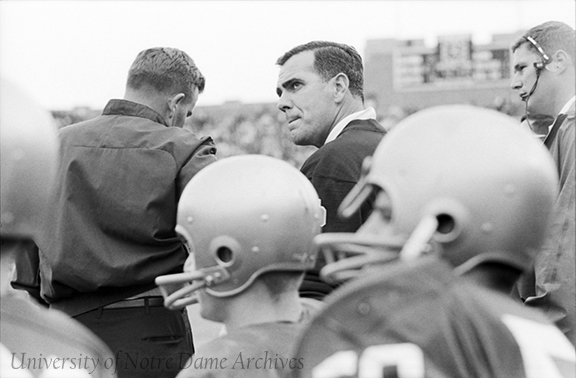
Legendary coach Ara Parseghian died on August 2, 2017, at the age of 94. He came to Notre Dame in late 1963 from Northwestern University having previously coaching at Miami University in Ohio, where he served first as assistant coach under Woody Hayes and then as head coach. As Notre Dame’s first non-alumnus head coach since Jesse Harper’s last season in 1917, Parseghian inherited a struggling Notre Dame football program that finished the 1963 season with a 2 and 7 record. Parseghian quickly turned the program around, going 9 and 1 in 1964. He missed the national championship title by 1:34 in a squeaker defeat against USC, the last game of the season. However, Parseghian and the team won other accolades that year: Parseghian was named Coach of the Year by multiple organizations and quarterback John Huarte won the coveted Heisman Trophy.

Over the course of his 11 years at Notre Dame, Parseghian compiled a record of 95-17-4, winning national championships in 1966 and 1973. As a coach he was known for his intensity and attention to detail. After leaving Notre Dame he worked as a television commentator covering college football, but he kept close to Notre Dame offering advice, when asked, to later generations of coaches. Among his former players, Parseghian was known for his loyalty and lifelong friendship.

In 1994, tragedy struck the Parseghian family when three of Ara’s grandchildren were diagnosed with a rare genetic disorder that causes early death in children – Niemann-Pick Type C (NPC). The family quickly established the Ara Parseghian Medical Research Foundation to bring attention to the devastating disease and to try to find a cure. After his coaching career, Parseghian stayed connected with Notre Dame and the South Bend community. In part because of this relationship, Notre Dame added NPC to the other rare and neglected diseases it was researching. A formal partnership between Notre Dame and the Parseghian foundation was established in 2010 and much progress toward a cure has been made since the foundation’s beginnings in 1994. More information about these efforts can be found at http://parseghianfund.nd.edu/

Ara Parseghian, his spirit, his leadership, and his generosity will be greatly missed at Notre Dame. In a fundraising letter written after his resignation from Notre Dame, Parseghian noted, “Wherever I am, I will never leave Notre Dame, not really” [March 1975, PATH/Parseghian].


Is the color photo reversed?